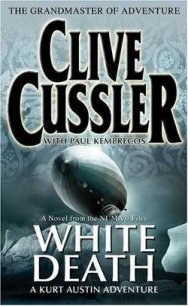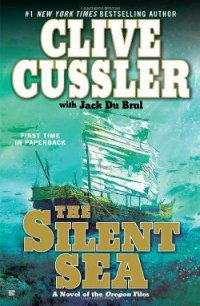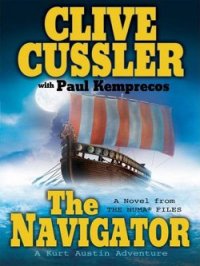Lost City - Cussler Clive (читать книги полные TXT) 📗
Her eyes shifted to Renaud, who was at the far end of the attractiveness spectrum. He sat on the other side of the tunnel, nursing his swollen hand. She frowned, thinking that the worst part of this whole affair was being entombed with an insect like Renaud. The thought depressed her, so she rose and walked to the staircase that led down to the main tunnel. Black water lapped over the top of the staircase. Not a chance of escape. She became depressed again. Looking for a diversion, she sloshed through puddles and climbed the ladder to the ice cave.
The glacier was already starting to retake its lost territory. New ice had formed in jagged icicles where there was none before. The ice had thickened and the body was no longer visible in its tomb. The helmet was still in its container. She picked it up and held it under a light where she could see the etchings. They were intricate and finely executed. The work of a master. The design struck her as not being simply decorative. There was a rhythm to it, as if it were telling a story. The metal seemed to pulsate with a life of its own. She got a grip on her rampaging thoughts. Lack of air was making her imagine things. If only she had more time, she could figure it out. Damn that Renaud.
She carried the helmet back into the tunnel. The walk in the thin air had exhausted her. She found a spot against the wall, propped the helmet beside her and sat down. The others had stopped talking. She could see their chests heaving as they sucked the anorexic air into
their lungs. She found that she was doing the same, gulping like a fish out of water, but still not meeting the demands of her lungs. Her chin dropped, and she fell asleep.
When she awoke, the lights had finally gone out. So, she said to herself, we will die in darkness after all. She tried to call out to the others, to wish them a farewell, but she didn't have the strength. She fell asleep again.
AUSTIN STRAPPED THE last waterproof stuff bag onto the SEA mobile flat rear deck behind the bubble cockpit and stepped back to inspect the job. The vehicle looked more like a mechanical pack mule than a high-tech submersible, but the jerry-rigged arrangement would have to do. With no idea how many people were trapped under the glacier, he had rounded up every set of scuba equipment and backup gear he could find and simply hoped for the best.
Austin gave an okay sign to Francois. The government observer had been standing by with a hand radio, acting as a combined liaison and translator between the ship and the helicopter. Frangois returned the gesture and spoke into the hand radio. The pilot of the French helicopter was waiting for the call.
Within minutes, the helicopter was lifting off the beach. It flew out to the NUMA boat, where it hovered and dropped a cable down to the deck. Austin ducked his head against the blast from the spinning rotors, grabbed the hook at the end of the cable and attached it to a four-point harness system. He and the crew had already secured the trailer and submersible so the load could be lifted in one piece.
He gave the pilot a thumbs-up. The cable went taut and the helicopter rose slightly and hung in space with its rotors madly slashing the air. Despite the ear-shattering racket, the submersible and trailer only lifted a few inches off the deck. The combined weight of the sub, trailer and cargo were beyond the aircraft's lifting capacity. Austin signaled the chopper to ease off. The line went slack and the load thumped back onto the deck.
Austin pointed to the helicopter and shouted in Francois's ear. "Tell them to stay where they are until I figure this out." As Francois translated, Austin got on his own radio and called Zavala, whose helicopter had been circling high above the ship. "We've got a problem," Austin said.
"So I see. Wish this chopper was a sky crane," he said, referring to the huge industrial helicopters that were designed to hoist big loads.
"We may not need one." Austin laid out what he had in mind. Zavala laughed and said, "My life must have been very dull before I met you." "Well?"
"Tricky," Zavala said. "Dangerous as hell. Audacious. But possible." Austin never doubted his partner's flying skills. Zavala had thousands of hours as a pilot in helicopters, small jet and turboprop aircraft. It was the vagaries, the unexpected that bothered him. A shift of the wind, human inattention or equipment failure could turn a carefully calculated risk into a disaster. In this case, the job could end with a mix-up in translation. He had to be sure the message was clear.
He pulled Francois aside and told him what he wanted the French pilot to do. Then he made him repeat his instructions back to him. Francois nodded in understanding. He spoke into his radio and the
French helicopter moved off to the side so that the lifting line was at an angle.
Zavala's chopper darted in and dropped a line, which Austin quickly spliced onto the harness. He gave the choppers a visual check, making sure there was plenty of space between the two aircraft. They would be pulled together by the weight they were lifting and he didn't want the helicopters tangling rotors.
Once more, Austin gave the signal to lift. The rotors churned away in earsplitting concert and this time the submersible and trailer seemed to leap skyward. A foot. Two feet. A yard. Two yards. The pilots were well aware of the fact that the helicopters were of unequal size and power, and adjusted for the difference with amazing skill.
They rose in slow motion, the strange load swinging between them until they were a couple of hundred feet above the lake's surface, and then they flew toward land until they were lost against the dark rock of the mountains. Zavala kept up a running commentary over the radio. He had to break off a couple of times to correct his position.
Austin didn't breathe easily until he heard Zavala's laconic announcement: "The eagles have landed."
Austin and several crewmen scrambled into a small boat and were on shore waiting when the helicopters came back, flying side by side, and landed on the beach. Austin climbed into Zavala's chopper and the French helicopter took on crew from the Mummichug.
Minutes later, they dropped down for a landing near the bright yellow SEA mobile which was on its trailer in front of the tunnel entrance. Austin supervised the crew as they adjusted the sub's load. Then the trailer was backed into the sloping tunnel to the water's edge. Chocks were inserted behind the wheels, while Austin left the tunnel to confer with Lessard. At Austin's request, the plant supervisor had retrieved another blueprint from his trove. He spread it out on a flat rock.
"These are the internal aluminum supports I told you about. You'll
encounter them a few hundred feet inside the tunnel. There are twelve sets laid three abreast, approximately ten yards between one set and the other."
"The submersible is less than eight feet wide," Austin said. "I've figured out that I'll only have to cut one column in each set to squeeze through."
"I suggest that you stagger your cuts. In other words, don't cut the same column position in every set. As you can see by this diagram,
the ceiling is the thinnest here of any place within the tunnel. You've got hundreds of tons of ice and rock pressing down on the tunnel."
"I've figured that into the equation."
Lessard's eyes bored into Austin's face. "I called Paris after you posed your plan and talked to a friend in the state power company. He said this end of the tunnel was built to move the lab trailers into place. It was discarded as prime access because as time went on there was danger of the roof collapsing. The columns were installed to keep the tunnel open as a ventilating air shaft. This is what worries me," he said, drawing his finger across the top of the tunnel drawn on the blueprint. "There's a large unstable pocket of water here. Because of the lateness of the season, it is even bigger than usual. If there is a weakness in the support system, the whole ceiling could come down."




